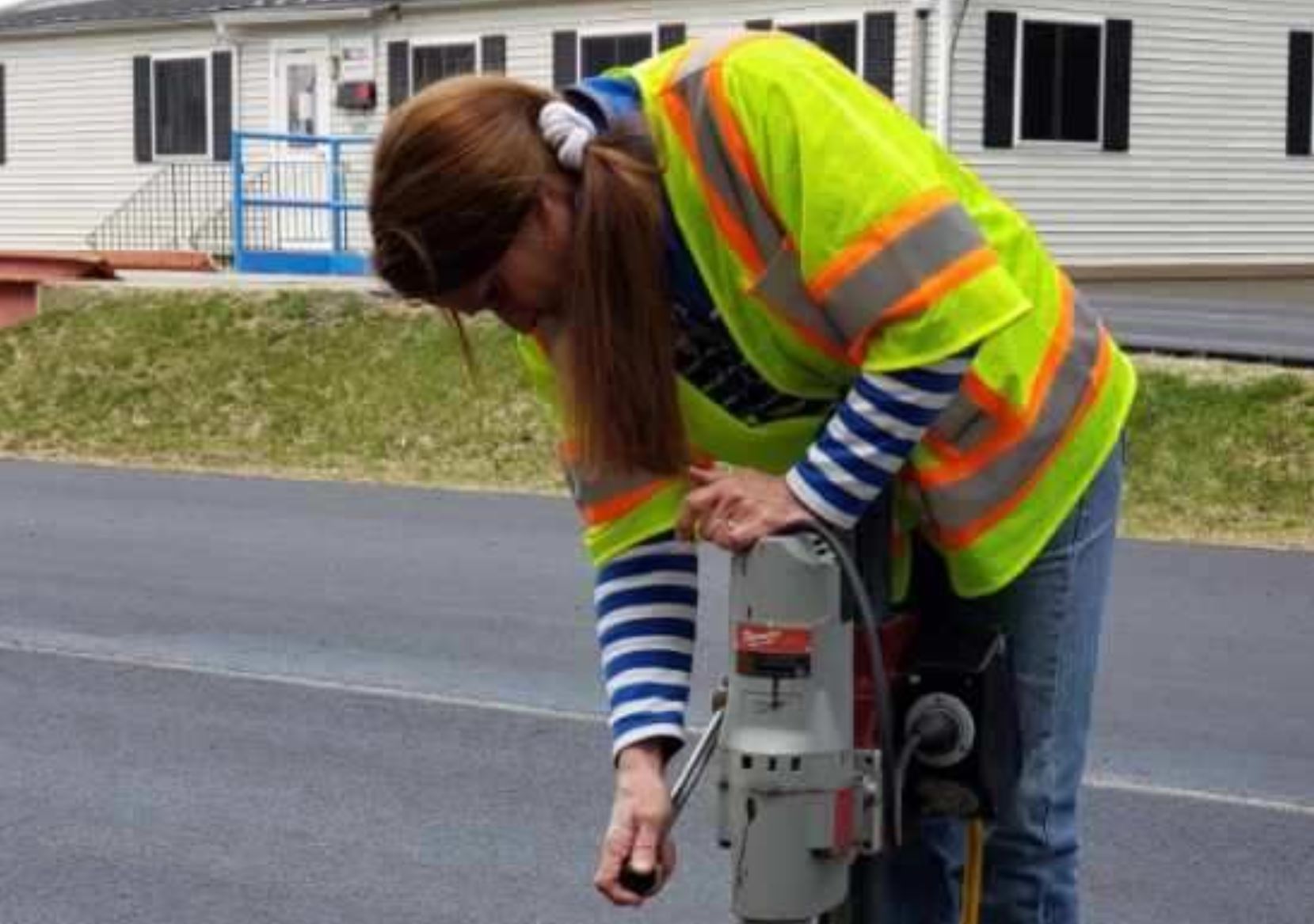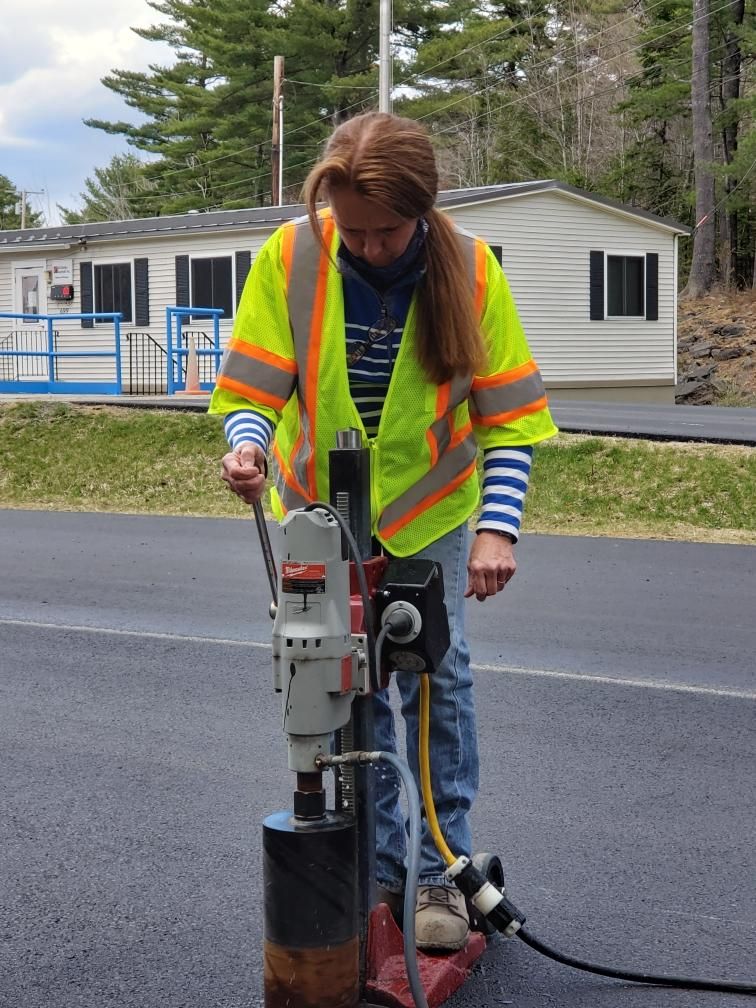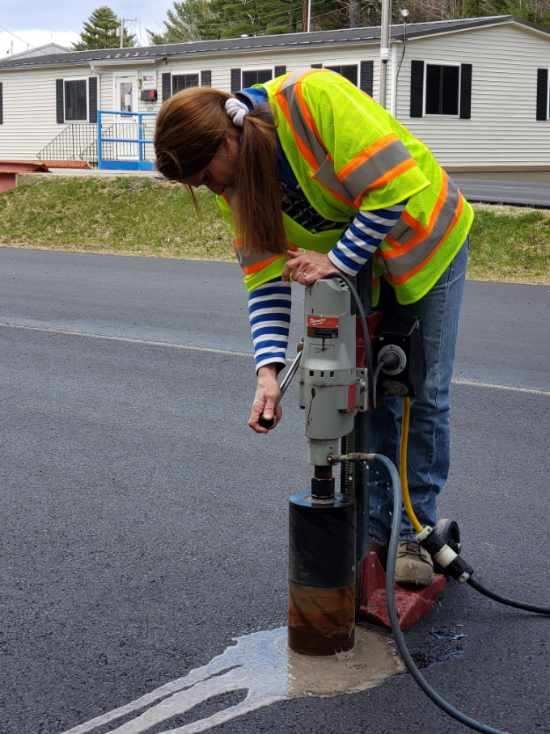Highlighting Quality Control Manager Mary Wescott
BY Sandy Lender

Taking a non-traditional path in a non-traditional career, Mary Wescott has achieved success as a woman of asphalt. Here, she shares how we can encourage other women to make the asphalt industry a more common choice for those seeking a fulfilling career. She joined the asphalt industry in 1997 with Pike Industries Inc., New Hampshire, where she ultimately served as a quality control manager. She subsequently served for one year as the quality manager in Maine for All States Materials Group, which is headquartered in Sunderland, Massachusetts. Wescott spoke of the similarities she saw at the two companies for the advancement of women.
“All States is family owned, whereas Pike, as part of CRH, is publicly held,” Wescott explained first. “We are a relatively small community of people, regardless of employer. Both have been accepting of women. As a person grows in an organization, the question is more one of whether she can be accepted in a leadership role. Smaller, more diverse groups are, in my experience, more accepting of the idea of a wider variety of people in leadership roles. All States definitely champions diversity.”
Wescott attained her Bachelor of Science degree in mechanical engineering from the University of New Hampshire while working. “Taking full advantage of a generous tuition reimbursement program (and a very supportive husband), I studied as a non-traditional student, primarily at night, for 10 years in order to complete my undergrad. While it was very challenging, there were two terrific takeaways: 1) Everything I learned was immediately applicable in my work. It gave me a better understanding of HMA plants, control systems, paving equipment and materials, as well as an instant application to help make my studies less abstract and more concrete; 2) It gave me outrageous confidence at work, as well as helping with all manner of troubleshooting.”
Wescott also attained a Northeast Transportation Technician certification during that time. “The NETTCP certs, the degree program and the practical experience ran parallel for me. It was challenging, but a very rich intellectual exercise. When I finally sat for my PE exam—Mechanical Engineering, Thermal and Fluid Systems—I felt an amazing sense of accomplishment.
“It’s easy to be dismissed by folks who may tend to believe that a typical woman has less ‘built in’ knowledge of all things mechanical than a typical man. Gaining my degree while working gave me credibility in the field, as well as in the conference room. And it didn’t hurt that it was 100 percent reimbursed—no student loans.”

Mary Wescott, Quality Manager in Maine, All States Materials Group
She accomplished all these goals without a specific mentor guiding her, so she works to encourage others when possible now.
“I had no mentor. That was the hardest part of coming up for me. As a result, I try to always support new folks, whether they report to me or not, in sticking with our industry and growing into their own leadership role.”
At this time, that means she can give a helping hand to more women than in the past. When she joined the asphalt industry in 1997, there were fewer female professional engineers in the companies and agencies with whom her company does business. “I will say that I see many more women who are PEs now than, say, 10 years ago. I’d put that number at a 300 percent increase.”
Female workers, whether in the QC/QA ranks or not, can encourage young women entering the industry with self-assurance.
“Self-assurance is such an important characteristic to project in any industry,” Wescott said. “Construction engineering is no exception. Over the years, I have seen a definite upward trend in the confidence exhibited by young women technicians and engineers.
“While there is no substitute for change over time, we can help young women in engineering by appreciating strengths without having them predicated upon traditionally perceived weaknesses. Being recognized as the ‘first woman’ achieving any kind of scrutinized goal can be a proud moment. However, being recognized as the ‘first engineer’ or ‘first person’ achieving a goal can engender an even prouder feeling, because it implies that you belong. When you get to the point where you no longer count or pay attention to the number of other women (if there are any) at a symposium or on a job site, then you start to realize that others are accepting of your presence without specifically noting your gender.
“Mentoring and encouragement can help women coming into the industry know that they belong to a creative group of people. They contribute to solving everchanging technical challenges. Their ideas and enthusiasm are essential to project design, execution and successful completion.”
In the quality control/quality assurance (QC/QA) sphere specifically, Wescott offers sage advice that speaks to any member of the industry, no matter his or her gender or age.
“To be honest, QA work is often questioned,” she cautioned. “We sometimes own the unfortunate task of telling people what they don’t want to hear. I’ve had some folks awfully upset with me before, but not because I’m a woman. The fact is, you can be disliked or distrusted for being short, tall, blue-eyed, of an atypical color or religion for your part of the country, etc. It is hard to win the trust of others, and in New England that calls for eating lunch alone for a long time before you are invited to have a sandwich with the crew on a jobsite. It just feels good when it finally happens, and once it does, your crew will stick with you regardless of differences. As far as professionalism, you should never, ever enjoy delivering bad news; don’t forget to share good news; and never ever lie. Do your job. You’ll be respected.”
Wescott shared three simple rules:
- Always show respect to the people around you and always require respect from them, as well. When people see this in you, they will gain an understanding of your value.
- Hold yourself to a higher standard than your employer or anyone else ever will. You can be excellent at what you do without hubris, and you can celebrate success without becoming complacent.
- Learn to be alone. It is the simple truth that you won’t necessarily be one of the group, especially at first. If you accept this strong possibility, it might not be as much of a surprise when it happens.
Even if a female leader experiences a few lunches alone, teamwork and collaboration remain vital to successful project completion. “It’s important to discern between the perception of collaboration vs. weakness,” Wescott reminded us. “I do believe that, in some cases, these two qualities can be confused.”

Mary Wescott, Quality Manager in Maine, All States Materials Group
Adding team members to a project does not have to be perceived as an inability to complete a project on your own. The paving industry isn’t conducive to working alone all the time. In QC/QA, some tests require working alone, and then the team puts in a collaborative effort where all members of the crew can shine. Wescott shared one project in particular that was challenging, yet successfully executed through a great effort of “planning, communication, teamwork.”
“So many challenging projects! I can choose one that was a pilot project for the NHDOT on a limited access highway about 10 years ago. It utilized several different mixes with several different polymer modified asphalts, different gradations, and different install techniques. First, we did our homework! We visited with other agencies and contractors who had related ongoing trials. We spent a great deal of time with our agency partner hashing out project details prior to starting the project.
We assembled the best in-house team we could from project management to production crews and quality control. We shared knowledge, research, and experience; then set up pre-construction, pre-pave, and pre-shift meetings to enhance communication. Several times during the project we met to discuss challenges and successes, again drawing from many sources for problem solving. All stakeholders kept good records, which we rolled into a post project meeting and report.”
As an engineer, Wescott is presently looking to take a next step in the industry. “These are important times as we move toward balanced mix design and end result testing,” she said. “I would like to apply my field experience to learning, writing and teaching about this cutting edge.”
Wescott has the benefit of a quality program skill set to help her with that next step. She listed the strengths of she’s bringing to the table: “Team-building skills, well-rounded experience, current technical knowledge and strong contacts with members of the industry/agency/academia triangle. Quality should be a value-added function. So, knowledge of basic business principles help to stay within budget constraints and improve margins.”
Perceptions
AsphaltPro: It’s a fact that asphalt work can be hot and dirty at times. How do you respond to people who say it’s a dirty job?
Mary Wescott: There are lots of dirty jobs—parenting, nursing, gardening. I do this work because it suits me, gives me the satisfaction of contributing to the country’s infrastructure, and it can’t very well be outsourced. I could go on and on. I love what I do.
AsphaltPro: What do you think is an incorrect perception that we, as an industry, can re-educate young people about to encourage more women to consider a career in the asphalt business?
Mary Wescott: What we do is fun and very satisfying. The folks you work with everyday are hard-working and don’t really have time to pick on anyone who shows up willing to hold her own. This is not an industry where you have to show up ready to fight for your place. Rather, it’s an extremely fair-minded industry where you show up ready to earn your place. If you bring a willingness to listen and be part of a team, you’ll do well, and go home tired but satisfied at the end of the day.
AsphaltPro: What is the most rewarding aspect for you of being in the asphalt business?
Mary Wescott: Working with good people, contributing to the nation’s infrastructure, and being respected for my work.
